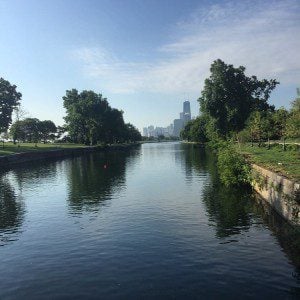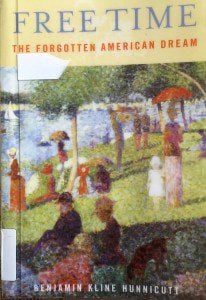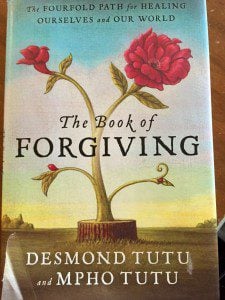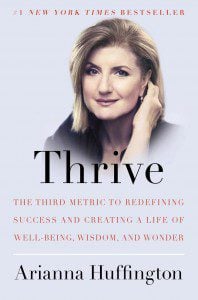The new album from the singer-songwriter Jason Isbell includes a song with the lyrics “Are you living the life you chose? Are you living the life that chose you?” I’ve been reflecting a lot recently about discerning how we are called. Last week, I spent four days in Chicago being trained as a facilitator for a new three-year conversation within the Unitarian Universalist Minister’s Association on the topic of “Where Leads Our Call?”
I should note here at the beginning that some of you will likely hear this question of calling more theistically — as in,
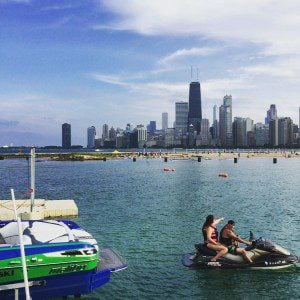
how am I responding to a call from ‘God,’ ‘Goddess,’ or ‘Spirit.’ For others, it is also possible to understand the language of calling from a humanist perspective: “Am I living in a way that leaves me fully alive, engaged, and connected with the world and those around me?” Underneath the language of calling is an invitation to slow down and discern if you are living in a way that is in right relationship with yourself, with other people, and with this one planet — or if you feel called to live differently.
In making such discernments, one tool from the Buddhist tradition is to consider if the way you are living is cultivating the “Ten Qualities that lead to Awakening” (generosity, renunciation, wisdom, strength, effort, truthfulness, determination, loving-kindness, equanimity) more than the “Ten Fetters” (self-identity, doubt, clinging, craving, ill-will, attachment, comparison, restlessness, and ignorance). Or from the Christian tradition, is the way you are living cultivating what is known as the Fruit of the Spirit: “love, joy, peace, patience, kindness, goodness, faithfulness, gentleness, and self-control?” If these positive qualities are missing (or if their opposites are present in abundance), then the invitation is to some basic discernment around calling and living in right relationship.
I would like to share with you some about my own experience of how my answer to the question “Where leads my call” has evolved over time. As I do so, I invite you to reflect on the paths your life has taken: have they been direct or circuitous? At various turning points, how have you discerned which path to take? And how might your the results (both positive and negative) from past decisions inform your discernment of where your call might lead in the future? (“Are you living the life you chose? Are you living the life that chose you?”)
To give you some of the highlights of how I ended up as the minister of a UU congregation, one way of discerning a call is to look back on what activities you did as a child in which hours would fly by with you hardly noticing any time had passed at all. For me, one of those activities was reading. So, from that perspective, it is no surprise that I was drawn to the UU ministry, which has a long tradition of welcoming intellectual sermons. I remember in seminary one of my professors lamenting that when he visited former students in their congregations, he could all too often pin-point the approximate time they graduated seminary from their bookshelves because they hadn’t read any new books since then! In contrast, one of the stereotypes of UUs is that we sometimes seem to be seeking “Salvation by Bibliography”: the approach of if you’ve got a problem, start by reading a book about it!
Also, in the same way that some of my friends passionately loved playing soccer or basketball for hours on end — or cooking or painting, working on old cars or spending time in nature — I really loved congregational life. I was in church multiple times every week for activities ranging from youth group to fellowship suppers, Bible studies and choirs.
In another tell-tale sign, I remember as a quite young child stumbling upon a seminary course catalog that had been left in a rack of informational material outside our church’s sanctuary and being fascinated that instead of what I was used to (classes in math, science, gym, reading, and writing), there were places where you could take entire courses on, for example, The Gospel of Matthew, various periods of Church History, or Approaches to Religious Education. (Perhaps you can think of other examples of stumbling upon different ways of being in the world than those which had previously been modeled for you — and the new possibilities that opened up.)
But going deep spiritually and asking hard questions about religion wasn’t modeled much for me in my childhood congregation, and I forgot about that excitement (that calling) about seminary for many years. Growing up in the midlands of South Carolina people (at least the people I knew) who did well in school and wanted to be challenged intellectually didn’t go into seminary, they went to medical school or law school.
So I went into college intending to be Pre-Med. But my freshman year, I took a year-long Humanities sequence that was team taught by a series of English, History, and Religion professors and covered one of your general education requirements in all three of those areas. And although biology and medicine continue to fascinated me, the lectures from the religion professor (who also had a strong background in philosophy) hooked me. They called to me, if you will. (Can you remember feeling that pull/lure/attraction in relation to teaching, science, music, or other areas?)
In that same Humanities sequence, the lectures in English and History were interesting (and likely called to others more strongly), but the lectures in religion were the ones that led me to the library to research at a much greater depth than was required. And by the end of my freshman year, I had declared a double-major in Religion and Philosophy, even though at that point I hadn’t even taken a full-fledged philosophy course. (Looking back, who in your life modeled for you a vocations that you began to discern a call toward?)
At that point, however, it was not clear that I was called to be a minister, much less a UU minister. (For one thing, I had not yet even heard of Unitarian Universalism.) It was a real turning point for me in college to decide whether to pursue graduate work in religion or philosophy. And then in divinity school whether to pursue ministry or teaching. And as divinity school ended whether to pursue congregational ministry or community ministry (working at a retreat center, in a homeless shelter, or as a chaplain). For some of you, it may have been more of a straight shot. But for me and others of you, there were many more forks in the road. (I invite you to reflect on these turning points in your life.)
I remember that the summer before I entered seminary, I was offered — without asking — a plum, well-paying youth ministry job. But even though I had grown up in a great youth group that had been in a theologically conservative Southern Baptist congregation, and I had just spent the past four years of college deconstructing everything I had been taught about religion growing up; the prospect of being a youth minister seemed terrifying. I had become skilled at doubt and asking hard questions, but I had almost no tools for reconstructing a religious life in any meaningful sense, nor was I yet fully comfortable with my doubts. But on the other side of seminary (after spending three years gathering some of those tools), I spent seven years as Associate Pastor in which youth ministry was a major part of job — and I loved it. (Perhaps you can think of times in your life when something that previously terrified you turned out to be something you were called to after further formation.)
The real turning point for me toward congregational ministry came when I realized that as much as I love — and continue to love — exploring religion intellectually, I am even more interested in what is possible in real life. I don’t want to merely write about social justice; I’m interested in what concrete steps individuals and groups, such as the congregation I serve, can take toward building the Beloved Community inside and beyond its walls. I don’t want to merely theorize about religion; I’m interested in what firsthand religious experiences — what experiences of the sacred — we can cultivate individually and in larger groups.
All that being said, I am also aware of how privileged I am to get paid to do a job that I love. As I’ve explored in a previous post on “Why a 40-Hour Work Week? (It’s Decreased Before. It Could Again.),” the vast majority of humans earn a living through “alienated labor”: work that is not personally fulfilling but that one must do anyway to afford even a basic minimum of food and shelter. That realization can turn up the volume on the call to work for economic justice and a revitalized Labor Movement.
There are also real ways in which the contingencies and injustices of life can throw us unexpectedly off our anticipated course. There are huge ways in which my life is irrevocably different than I expected in the wake of my father’s death from esophageal cancer when I was in 9th grade — or the ways that my wife’s life was changed by the death of her mother from complications around Type-I Diabetes when she was age 21. (You can likely think of examples from your own life.) Or consider the death of the 28-year old African American woman Sandra Bland, who was due to start a new job this week on Monday, August 3, but instead is dead in the aftermath of an unnecessary traffic stop when her mild resistance and assertion of her own freedom, dignity, and rights was met with abusive police force.
I remember being pulled over in Virginia in a speed trap, and having a police officer make it clear that if I kept asking him questions he would escalate the situation — and I’m a white dude and my wife was sitting beside me as a witness. I have friends who are police officers and who do their job well. But too many police officers are confusing “Protect and Serve” with “Respect my authority without question,” particularly toward people of color. Along these lines, if you haven’t yet read Ta-Nehisi Coates’s book Between the World and Me, I strongly encourage you to do so.
For now, as you continue reflecting on all the good and all the bad that has brought us to this present moment, I’m reminded of wisdom that the late Forrest Church, former minister of All Souls Unitarian in New York City, used to share regularly: “Do what you can. Want what you have. Be who you are.” Despite all that may have come before, there is wisdom there for us for discerning the one next step toward which you are called: “Do what you can. Want what you have. Be who you are.” (“Are you living the life you chose? Are you living the life that chose you?”)
In the coming days and weeks, I invite you to continue to reflect on “Where leads you call?”: how you feel led to become more fully in right relationship with yourself, with others, and with this planet. For now, I would like to leave you with a blessing that I have adapted from one written by the leadership of the spiritual direction training program I attended a few years ago:
May you enter evermore deeply into your humanity that your heart may open more widely to receiving more and more love.
May we always continue to be stretched that we may see, hear, and embrace the new things emerging in our midst.
May our spirits continue to be drawn together into Beloved Communities of service and singing, meditation and listening, hospitality and learning, compassion and justice.
And may we continue to freely choose to be ourselves — fully alive, grateful, and connected — that we may love and serve one another, our families and communities, the larger progressive religious movement and the world, and even the universe itself.
The Rev. Dr. Carl Gregg is a trained spiritual director, a D.Min. graduate of San Francisco Theological Seminary, and the minister of the Unitarian Universalist Congregation of Frederick, Maryland. Follow him on Facebook (facebook.com/carlgregg) and Twitter (@carlgregg).
Learn more about Unitarian Universalism:
http://www.uua.org/beliefs/principles



